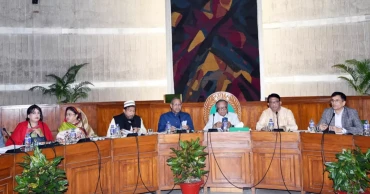schools
Brazil enacts law restricting smartphone use in schools
Brazil’s President Luiz Inácio Lula da Silva signed a law on Monday restricting smartphone use in schools, aligning with a global trend toward such measures, reports AP.
Effective February, the law will apply to elementary and high school students across the nation. It establishes guidelines allowing device use only in emergencies, for educational activities, or by students with disabilities requiring them.
Where does smartphone use start getting problematic?
“We cannot allow humanism to be replaced by algorithms,” Lula said during a private ceremony in Brasilia. He described the law as a recognition of educators' efforts to support children and teenagers.
A study by Fundacao Getulio Vargas in May revealed that Brazil has 258 million smartphones, surpassing its population of 203 million. Market research from last year showed Brazilians spend an average of 9 hours and 13 minutes daily on screens, among the highest globally.
Education Minister Camilo Santana noted that children’s early exposure to online content complicates parental monitoring, and limiting smartphone use in schools aims to address this challenge.
The legislation garnered rare bipartisan support from both Lula’s allies and those of his far-right predecessor, Jair Bolsonaro.
Parents and students largely back the initiative. An October survey by Datafolha found nearly two-thirds of respondents supported banning smartphones in schools, and over three-quarters believed the devices harm more than help children.
India to have 1 billion smartphone users by 2026: Deloitte
Ricardo Martins Ramos, a 43-year-old father and restaurant owner in Rio de Janeiro, called the restrictions “tough but necessary,” explaining that while smartphones are useful for schoolwork, excessive social use is detrimental. His 13-year-old daughter Isabela agreed, citing classmates’ struggles to concentrate during lessons. However, she highlighted unresolved issues like bullying and harassment.
As of 2023, two-thirds of Brazilian schools had some form of smartphone restriction, with 28% enforcing a total ban, according to an August survey by the Brazilian Internet Steering Committee. Several states, including Rio de Janeiro, Maranhão, and Goiás, have enacted local bans, but enforcement remains challenging. Sao Paulo is currently debating extending restrictions to both public and private schools.
Gabriele Alexandra Henriques Pinheiro, a 25-year-old beauty professional and mother of a boy with autism spectrum disorder, supports the restrictions but noted adults often set poor examples of smartphone use. She admitted that her own reliance on her device complicates efforts to limit her son’s screen time.
Experts and institutions have linked children’s smartphone use to bullying, anxiety, suicidal ideation, and diminished concentration. Other countries have implemented similar restrictions: China limited children’s smartphone use last year, and France has banned the devices in schools for children aged 6 to 15.
In the United States, eight states have passed laws or policies to curb smartphone use in classrooms. Meanwhile, more European parents are voicing concerns about the safety and mental health risks associated with smartphone use among children.
A UNESCO report published in September revealed that one in four countries has already imposed school restrictions on smartphones.
At a U.S. Senate hearing last year, Meta CEO Mark Zuckerberg apologised to parents of children harmed via social media and highlighted ongoing industry efforts to improve child protection.
1 year ago
Schools to remain open during Ramadan as Appellate Division stays HC order
The Appellate Division on Tuesday (March 12, 2024) stayed the High Court order on keeping the primary and secondary schools closed during the month of Ramadan.
A 5-member Appellate Division bench led by Chief Justice Obaidul Hassan passed the order hearing an appeal filed against the High Court order.
Attorney General AM Amin Uddin stood for the state while Advocate AKM Faiz stood for the writ petitioner.
Attorney General AM Amin Uddin told reporters that following the Appellate Division order there will be no bar on running schools during Ramadan.
Primary, secondary schools to remain closed during Ramadan: HC
On March 10, the HC stayed for two months the government’s decision to keep the primary and secondary schools open in the first 10 and 15 days of Ramadan respectively.
The HC bench of Justice KM Kamrul Kader and Justice Khizir Hayat passed the order following a petition seeking closure of school activities during Ramadan.
Advocate Mahmuda Khanam stood for the writ petitioner while deputy attorney general Sheikh Md Saifuzzaman represented the state.
On February 8, the government amended the holiday list for educational institutions keeping the regular activities of secondary schools open for 15 days during the month of Ramadan. The Education Ministry issued a notice in this regard.
In another notice, the Primary and Mass Education Ministry issued a notice to keep the activities of primary schools during the month of Ramadan for ten days.
Female student assaulted at JnU dormitory, journalist threatened
Advocate Md Ilias Ali Mandal, a guardian, filed a writ petition on February 25, challenging the two orders of the government.
Secretaries to the Primary and Mass Education Ministry, Education Ministry, deputy secretary of Primary and Mass Education Ministry and deputy secretary of Education Ministry, Director General of the Directorate of Primary Education Department, Director of Child Welfare Trust were made respondents.
1 year ago
Primary, secondary schools to remain closed during Ramadan: HC
The High Court on Sunday (March 10, 2024) stayed for two months the government’s decision to keep the primary and secondary schools open in the first 10 and 15 days of Ramadan respectively.
The HC bench of Justice KM Kamrul Kader and Justice Khizir Hayat passed the order following a petition seeking closure of school activities during Ramadan.
Advocate Mahmuda Khanam stood for the writ petitioner while deputy attorney general Sheikh Md Saifuzzaman represented the state.
Milk, eggs, meat, and fish to be sold affordable prices at 30 points in capital
Following the order, the academic activities of primary and secondary schools will remain closed during the month of Ramadan.
On February 8, the government amended the holiday list for educational institutions keeping the regular activities of secondary schools open for 15 days during the month of Ramadan. The Education Ministry issued a notice in this regard.
In another notice, the Primary and Mass Education Ministry issued a notice to keep the activities of primary schools during the month of Ramadan for ten days.
Advocate Md Ilias Ali Mandal, a guardian, filed a writ petition on February 25, challenging the two orders of the government.
SCBA election: Khokon, Monjurul elected president, secretary
Secretaries to the Primary and Mass Education Ministry, Education Ministry, deputy secretary of Primary and Mass Education Ministry and deputy secretary of Education Ministry, Director General of the Directorate of Primary Education Department, Director of Child Welfare Trust were made respondents.
Ramadan is likely begin from March 11 or March 12 depending on the sighting of the moon.
1 year ago
ChatGPT maker releases tool to help teachers detect if AI wrote homework
The maker of ChatGPT is trying to curb its reputation as a freewheeling cheating machine with a new tool that can help teachers detect if a student or artificial intelligence wrote that homework.
The new AI Text Classifier launched Tuesday (January 31, 2023) by OpenAI follows a weeks-long discussion at schools and colleges over fears that ChatGPT’s ability to write just about anything on command could fuel academic dishonesty and hinder learning.
OpenAI cautions that its new tool – like others already available – is not foolproof. The method for detecting AI-written text “is imperfect and it will be wrong sometimes,” said Jan Leike, head of OpenAI’s alignment team tasked to make its systems safer.
Read More: What is ChatGPT, why are schools blocking it?
“Because of that, it shouldn’t be solely relied upon when making decisions,” Leike said.
Teenagers and college students were among the millions of people who began experimenting with ChatGPT after it launched Nov. 30 as a free application on OpenAI’s website. And while many found ways to use it creatively and harmlessly, the ease with which it could answer take-home test questions and assist with other assignments sparked a panic among some educators.
By the time schools opened for the new year, New York City, Los Angeles and other big public school districts began to block its use in classrooms and on school devices.
Read More: CES 2023: Walton's smart AI products get huge response
The Seattle Public Schools district initially blocked ChatGPT on all school devices in December but then opened access to educators who want to use it as a teaching tool, said Tim Robinson, the district spokesman.
“We can’t afford to ignore it,” Robinson said.
The district is also discussing possibly expanding the use of ChatGPT into classrooms to let teachers use it to train students to be better critical thinkers and to let students use the application as a “personal tutor” or to help generate new ideas when working on an assignment, Robinson said.
Read More: AI & Future of Jobs: Will Artificial Intelligence or Robots Take Your Job?
School districts around the country say they are seeing the conversation around ChatGPT evolve quickly.
“The initial reaction was ‘OMG, how are we going to stem the tide of all the cheating that will happen with ChatGPT,’” said Devin Page, a technology specialist with the Calvert County Public School District in Maryland. Now there is a growing realization that “this is the future” and blocking it is not the solution, he said.
“I think we would be naïve if we were not aware of the dangers this tool poses, but we also would fail to serve our students if we ban them and us from using it for all its potential power,” said Page, who thinks districts like his own will eventually unblock ChatGPT, especially once the company’s detection service is in place.
Read More: How Can Artificial Intelligence Improve Healthcare?
OpenAI emphasized the limitations of its detection tool in a blog post Tuesday, but said that in addition to deterring plagiarism, it could help to detect automated disinformation campaigns and other misuse of AI to mimic humans.
The longer a passage of text, the better the tool is at detecting if an AI or human wrote something. Type in any text -- a college admissions essay, or a literary analysis of Ralph Ellison’s “Invisible Man” --- and the tool will label it as either “very unlikely, unlikely, unclear if it is, possibly, or likely” AI-generated.
But much like ChatGPT itself, which was trained on a huge trove of digitized books, newspapers and online writings but often confidently spits out falsehoods or nonsense, it’s not easy to interpret how it came up with a result.
Read More: Ai and Future of Content Writing: Will Artificial Intelligence replace writers?
“We don’t fundamentally know what kind of pattern it pays attention to, or how it works internally,” Leike said. “There’s really not much we could say at this point about how the classifier actually works.”
Higher education institutions around the world also have begun debating responsible use of AI technology. Sciences Po, one of France’s most prestigious universities, prohibited its use last week and warned that anyone found surreptitiously using ChatGPT and other AI tools to produce written or oral work could be banned from Sciences Po and other institutions.
In response to the backlash, OpenAI said it has been working for several weeks to craft new guidelines to help educators.
Read More: Ameca: World’s Most Realistic Advanced Humanoid Robot AI Platform
“Like many other technologies, it may be that one district decides that it’s inappropriate for use in their classrooms,” said OpenAI policy researcher Lama Ahmad. “We don’t really push them one way or another. We just want to give them the information that they need to be able to make the right decisions for them.”
It’s an unusually public role for the research-oriented San Francisco startup, now backed by billions of dollars in investment from its partner Microsoft and facing growing interest from the public and governments.
France’s digital economy minister Jean-Noël Barrot recently met in California with OpenAI executives, including CEO Sam Altman, and a week later told an audience at the World Economic Forum in Davos, Switzerland that he was optimistic about the technology. But the government minister — a former professor at the Massachusetts Institute of Technology and the French business school HEC in Paris — said there are also difficult ethical questions that will need to be addressed.
Read More: ChatGPT by Open AI: All you need to know
“So if you’re in the law faculty, there is room for concern because obviously ChatGPT, among other tools, will be able to deliver exams that are relatively impressive,” he said. “If you are in the economics faculty, then you’re fine because ChatGPT will have a hard time finding or delivering something that is expected when you are in a graduate-level economics faculty.”
He said it will be increasingly important for users to understand the basics of how these systems work so they know what biases might exist.
3 years ago
JS body suggests incorporating oceanography in schools, colleges curricula
The Parliamentary Standing Committee on Science and Technology on Wednesday recommended the government to incorporate oceanography in the curricula from grade-I to higher secondary level.
The recommendation came from the 15th meeting of the committee, held at Parliament Building with its chairman AFM Ruhal Haque in the chair, said a press release.
In the meeting, the committee of the 11th parliament reviewed the implementation progress of its previous decisions.
Read more: Parliamentary Committee suggests reopening of Sonamasjid land port for immigration
The parliamentary watchdog asked the government to implement its recommendations made in the previous meetings.
Science and Technology Minister Architect Yeafesh Osman joined the meeting on an invitation of the committee’s chief.
Committee members Iqbalur Rahim, Shafiqul Azam Khan, Mozaffar Hossain, Sherin Ahmed and Selima Ahmad attended the meeting.
Read more: Parliamentary body for increasing DNA, dope test labs
3 years ago
Solar in schools: PM’s directive goes unheeded for 7 yrs
It has been more than seven years since the prime minister directed the authorities to install rooftop solar power system in all schools across the country. The order is yet to see the light.
An official document, obtained by the UNB, shows that Prime Minister Sheikh Hasina issued an order on April 9 in 2015 to the power authorities to bring country’s all schools under solar power system
Following the order, the Power Division of the Ministry of Power, Energy and Mineral Resources asked all the 6 power distribution companies to take initiative to implement the order.
Read: Climate Smart Solar Irrigation to meet challenges of climate change: Researchers urged
As per the order, Bangladesh Power Development Board (BPDB), Bangladesh Rural Electrification Board (BREB), Dhaka Power Distribution Company Limited (DPDC), Dhaka Electric Supply Company (Desco), West Zone Power Distribution Company Limited (WZPDCL), and Northern Electric Supply Company (Nesco) conducted their own surveys under a certain category and selected 92,513 schools across the country to install the rooftop solar power system.
According to the surveys, the total rooftop solar power plants' length was calculated to be 20.031 million square meters which would generate 1,185 MW of electricity.
Officials said the main idea behind the PM's order was to promote green energy and reduce carbon emission as part of Bangladesh's Global Climate Change commitment.
Sources said though the surveys were conducted by the distribution companies, there was no follow-up either from the ministry, or from the distribution companies to implement the highest official directive.
About five years later, the Sustainable and Renewable Energy Development Authority (Sreda) and Power Cell, the technical wing of the Power Division, prepared a report fixing some criteria and also the process that would apply in implementation of a project in this regard.
Sources said the report was sent to the Power Division on May 26 last year. But the Power Division found the report a bit incomplete as it didn't mention which ministry would bear a huge cost that would be required to executive the project.
Secondly, they said, it was also not clear as to whether the ministry concerned should implement such a project on Capex Model or on Opex Model.
Read: Govt exploring rooftop, floating solar power for scarcity of lands: Nasrul
In the Capex Model, the beneficiary ministry or an organisation would install the solar plant at its own cost and get the ownership. On the other hand, under the Opex Model, a third party would install the plant at its own cost as an independent power producer (IPP) and sell the electricity to the beneficiary organisation.
Official sources said that recently the Sreda and the Power Cell recast their joint report on the issue and re-sent the report to the Power Division.
They said the report was prepared considering the country's achievement of completing 100 per cent electricity coverage.
A source at Power Division, wishing not to be named, informed that a high level meeting of the decision recently decided to send an executive summary on the subject to the prime minister for further instruction.
3 years ago
With no fuel and no cash, Sri Lanka keeps schools closed
Cash-strapped Sri Lanka on Sunday extended school closures for one week because there isn't enough fuel for teachers and parents to get children to classrooms, and the energy minister appealed to the country's expatriates to send money home through banks to finance new oil purchases.
A huge foreign debt has left the Indian Ocean island with none of the suppliers willing to sell fuel on credit. The available stocks, sufficient for only several days, will be provided for essential services, including health and port workers, public transport and food distribution, officials said.
”Finding money is a challenge. It’s a huge challenge,” Power and Energy Minister Kanchana Wijesekera told reporters.
Read: Gas lines and scuffles: Sri Lanka faces humanitarian crisis
He said the government has ordered new fuel stocks and the first ship with 40,000 metric tons of diesel is expected to arrive on Friday while the first ship carrying gasoline would come on July 22.
Several other fuel shipments are in the pipeline. But he said authorities are struggling to find $587 million to pay for the fuel. Wijesekera said that Sri Lanka owed about $800 million to seven fuel suppliers.
Last month, schools were closed nationwide for a day due to fuel shortages and had remained closed for the last two weeks in urban areas. Schools will remain shut until Friday.
Authorities also announced countrywide power cuts of up to three hours a day from Monday because they can’t supply enough fuel to power generating stations. Sweeping power cuts have been a blight on Sri Lanka's economy for months, along with severe shortages of essentials including cooking gas, medicine and food imports.
Wijesekera said the main problem is the lack of dollars and appealed to some 2 million Sri Lankans working abroad to send their foreign exchange earnings home through banks instead of informal channels.
He said workers’ remittances, which usually stood at $600 million per month, had declined to $318 million in June.
According to the Central Bank, the remittances — the nation’s main foreign exchange earner — dropped from $2.8 billion in the first six months of 2021 to $1.3 billion in the same period this year for a decline of 53%.
Read: Senior US officials visit Sri Lanka to help resolve crisis
The drop came after the government last year ordered the mandatory conversion of foreign currency. It said that black-market premiums have led people to hoard foreign currency.
Sri Lanka's has been getting most of its fuel needs from neighboring India, which provided it with a credit line. The government said it was also negotiating with suppliers in Russia and Malaysia.
Sri Lanka has suspended repayment of about $7 billion in foreign loans due this year out of $25 billion to be repaid by 2026. The country’s total foreign debt is $51 billion.
The economic meltdown has triggered a political crisis with widespread anti-government protests erupting across the country. Protesters have blocked main roads to demand gas and fuel, and television stations showed people in some areas fighting over limited stocks.
In the capital, Colombo, protesters have been occupying the entrance to the president’s office for more than two months to demand President Gotabaya Rajapaksa's resignation. They accuse him and his powerful family that included several siblings holding top government positions of plunging the country into the crisis through corruption and misrule.
3 years ago
Sri Lanka closes schools, limits work amid fuel shortage
Sri Lankan authorities on Friday closed schools and asked public officials not to come to work in a desperate move to prepare for an acute fuel shortage that is expected to last days amid the nation's worst economic crisis in decades.
The Public Administration Ministry asked the public officials — except for those who maintain essential services — not to come to work on Friday “in a view of current fuel shortage and issues in transport facilities” across the country.
Also read: Sri Lankan power family falls from grace as economy tanks
State- and government-approved private schools also closed Friday amid the worsening fuel shortage, with thousands of people waiting in queues at fuel stations across the country for days at a time.
Sri Lanka is now almost without gasoline and faces an acute shortage of other fuels as well.
The government has been struggling to find money to pay for the importation of fuel, gas and other essentials in recent months as the Indian Ocean island nation is on the brink of bankruptcy.
Its economic woes have brought on a political crisis, with the government facing widespread protests and unrest.
For months, Sri Lankans have endured long lines to buy those essentials, most of which come from abroad. Shortages of hard currency have also hindered imports of raw materials for manufacturing and worsened inflation.
Protesters blocked main roads to demand gas and fuel, and television stations showed people in some areas fighting over limited stocks.
Authorities have announced countrywide power cuts of up to four hours a day because they can’t supply enough fuel to power generating stations.
Sri Lanka has suspended repayment of about $7 billion in foreign loans due this year out of $25 billion to be repaid by 2026. The country’s total foreign debt is $51 billion. The finance ministry says the country currently has only $25 million in usable foreign reserves.
Also read: Ranil Wickremesinghe takes oath as Sri Lanka's PM
Protesters have occupied the entrance to the president’s office for more than a month, calling for President Gotabaya Rajapaksa to resign.
Months of anti-government rallies have led to the near-dismantling of the once-powerful ruling family, with one of the president’s brothers resigning as prime minister, and other siblings and a nephew leaving their Cabinet posts. Protesters accuse the Rajapaksas of triggering the crisis through corruption and misrule.
Sri Lanka's new Prime Minister Ranil Wickremesinghe said Monday that about $75 billion is needed urgently to help provide essential items, but the country’s treasury is struggling to find even $1 billion.
Attacks by Rajapaksa’s supporters on protesters last week sparked nationwide violence that left nine people — including a lawmaker — dead, and more than 200 injured. Homes of lawmakers and their supporters were burned down.
3 years ago
Sylhet schools shut due to flooding
Hundreds of students have been hit hard as flooding forced authorities to close educational institutions in Sylhet district.
According to the district primary education office, floodwaters have entered some 550 educational institutions in the district.
Also read:No improvement in Sylhet's flood situation
Besides, 200 educational institutions have been designated as shelters for the flood-hit residents of the district, forcing students to stay away from their academic activities.
All the rivers of the district are full to the brim due to the onrush of hilly waters from the upstream and incessant rains over the past several days, according to officials.
The low-lying areas of the district have already been flooded, rendering nearly one lakh people marooned.
There are 1,477 primary schools in the district and 400 schools were affected till Wednesday. Goainghat, Kanaighat, Jointapur, Jakiganj and Companiganj upazilas are the worst hit.
District education officer Shakhawat Ershad feared that new areas in the district could be flooded soon due to the rise in water levels of all the rivers in the district.
Besides, sources said that 150 secondary schools and madrasas have been inundated due to flooding.
Flood situation in Sylhet
The overall flood situation in Sylhet district worsened further Thursday morning, with some rivers still flowing above the danger level due to the onrush of hilly waters from India.
Although the showers have subsided in the district in the last two days, the water levels in rivers and haors of Sylhet rose two more inches due to the onrush this morning.
According to the administration, at least 30 areas of Sylhet city have been flooded.
Also read: Flood situation worsens in Sylhet; low-lying areas in city inundated
The flood situation has also worse in 13 upazilas of the district -- Companiganj, Gowainghat, Kanaighat, Zakiganj, Jaintapur and Sylhet Sadar upazilas to name a few.
The floods have affected 20 lakh people in Sylhet district and city.
Meanwhile, the floods have triggered power cuts in different upazilas and Sylhet city, hitting hard some 11.5 lakh consumers of Bangladesh Power Development Board and Palli Bidyut Samiti.
3 years ago
Fewer boys return to schools than girls after long Covid hiatus: Study
The rate of attendance among girls is higher than that of boys as schools reopen after a long hiatus from the Covid pandemic, according to a recent study.
It finds that absenteeism was 16 percent to 37 percent for boys and 14 percent to 35 percent for girls in the primary schools, and 34 percent to 45 percent for boys and 28 percent to 41 percent for girls in the secondary schools.
The research conducted under the "Safe Back to School Campaign" by 21 national and international organisations was unveiled at a programme in Dhaka Wednesday.
It was carried out to capture school attendance, maintenance of health safety measures and mental well-being of the students after the long closures of the schools.
The report identified school-goers' involvement in economic activities, child marriage, migration of families to other places, shifting to other educational institutes – especially Qawmi madrasah, and loss of interest in the study as the primary reasons for absenteeism.
READ: Decisive steps needed to keep boys in school: Unesco
The students felt irritated, lonely, isolated and under mental pressure during the lockdown.
The causes explained by the parents, teachers and education officers include financial crisis, uncertain future, risk of child marriage, risk of discontinuing education, increase in problems in the family, not being able to attend online classes, and difficulties in understanding lessons.
After the reopening of the school, these problems have reduced, but some new issues have arisen, such as learning difficulties, difficulties in understanding lessons and challenges in mingling with others.
The report also found that 74 percent of students wear masks in school and 72 percent overall maintain social distance in the classroom.
Speaking at the programme, Education Minister Dipu Moni said, “We need to have a long-term plan to make up for the losses in the primary and secondary schools. This study coincides with the results of the government studies.”
“We have to work at the grassroots level to bring back the victims of child marriage. We have started training 200,000 teachers to work on mental health. Each educational institution will have at least two trained counselling teachers and a professional counsellor in each district.”
The Safe Back to School Campaign was launched on February 10, 2021 to bring children back to the classroom safely.
Since then, the campaign has been doing advocacy at the local and national levels while also raising public awareness.
3 years ago






.jpg)








